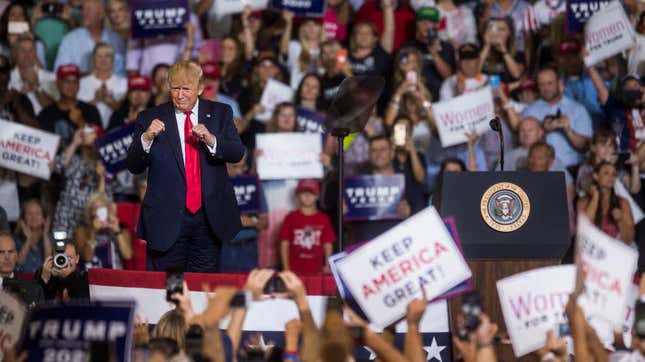
A majority of Americans fear all the racist and otherwise offensive rah rah being spewed in the name of public discourse lately will lead to outright violence, and that it needs to stop.
That’s the finding of a new Pew Research Center poll in which some three-quarters of all Americans (73 percent)—Democrats and Republicans, alike—said “elected officials should avoid using heated language because it could encourage violence.”
The results of the poll, which was taken this spring, come out at the end of a week in which Donald Trump has dominated headlines with his inflammatory take that four first-term congresswomen of color should “go back” to where they came from if they don’t like his policies.
That take was then compounded by a rally Trump headlined at which the predominantly white supporters in attendance chanted “Send her back!” in reference to one of his targets, Minnesota Rep. Ilhan Omar, an American of Somali heritage.
So it may come as no surprise that, according to the Pew poll, a majority of Americans—55 percent—point the finger of blame at Trump for changing “the landscape of politics for the worse,” as U.S. News and World Report notes:
The Pew poll found that 85% of Americans believe the tone and nature of political debate in the country has become more negative, while 12% believe it has remained the same. Just 3% think it has improved.
Eighty-five percent of Americans also believe that the political environment has become less respectful.
About three-quarters of people, or 76%, believe the political debate has become less factual.
Meanwhile, 46% think politics has become less entertaining and 35% believe it has gotten more entertaining.
More than half, 55%, of Americans say the political environment has changed for the worse.
The same percentage say President Donald Trump has changed the landscape of politics for the worse, while about one-quarter say he’s changed it for the better.
However, as may also be expected, there were disparities between those who identified Democrat or Democrat-leaning and those who identified as or leaned more toward the party of Trump.
Democrats were more likely (84 percent) to say Trump had worsened political discourse than Republicans (49 percent), with younger Republicans more likely among members of the GOP to express disapproval, Pew found.
In addition, GOP-ers and those leaning same were more likely to express feelings of being aggrieved when it came to perceptions of who has more “freedom” to express their views.
Per U.S. News:
Republicans feel Democrats have it better. Almost two-thirds of Republicans, or 64%, think Democrats are very free to express their views, but only 26% of Republicans believe they have the same liberty.
Perhaps because so often those “views” are the very example of the kind of aggressive and offensive rhetoric frowned upon by those polled?
But I digress.
Pew researchers found that Americans also agreed that Trump’s comments were often a source of negative emotion, even with the numbers widely divergent between Democrats and Republicans:
Eight-in-ten or more Democrats say Trump’s comments often or sometimes make them feel concerned, confused, embarrassed, exhausted, angry, insulted and frightened. While Republicans are considerably less likely than Democrats to report these negative reactions to Trump’s rhetoric, about six-in-ten (59%) say they are at least sometimes concerned by his comments, while about half say they are at least sometimes confused (47%) or embarrassed (53%).
However, in a stat that perhaps goes to the heart of the vast divide that has roiled this country, Pew also found that “About seven-in-ten or more Republicans say [Trump’s] comments often or sometimes make them feel entertained, informed, hopeful, excited, happy, proud, respected and inspired.”
Another stat that perhaps points to the problem? Most Americans (some 6 in 10) agreed that people don’t all agree as to what constitutes “racist or sexist” language, according to Pew:
About two-thirds (65%) of Republicans and Republican leaners say people generally do not agree over the definition of racist language; 58% of Democrats and Democratic leaners say the same. Black people are somewhat more likely than whites and Hispanics to say people agree about what is considered racist language, although blacks, whites and Hispanics are all more likely to say people do not agree on what kind of language is racist than to say that there is broad agreement.

